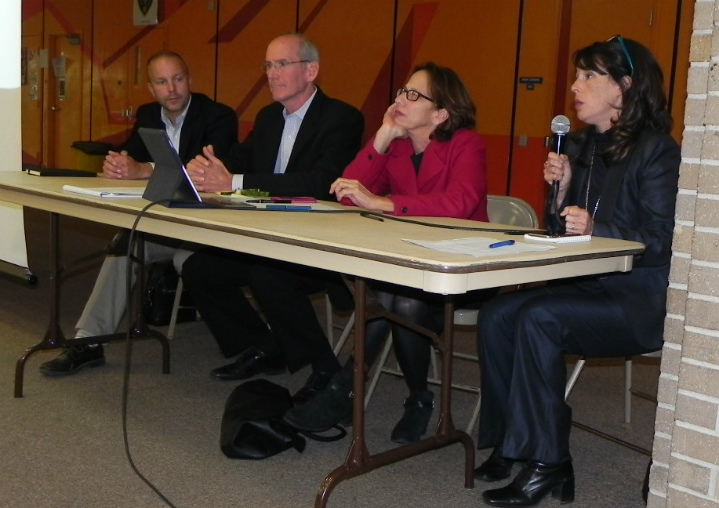At the risk of oversimplification, Amber Arellano believes the problem of delivering an equitable education to today’s K-12 students can be divided into two parts.
It starts with an awareness of the issues, and concludes with determining and then implementing solutions, says the executive director of the Education Trust-Midwest. More people are recognizing the problem of sinking test scores and achievement; now they need to agree on the solutions, Arellano said at the recent West Michigan K-12 Education Forum.
“We’re on the same page about the what,” Arellano told a crowd at Ottawa Hills High School. “Now it’s about the how.”

The declining performance of Michigan’s students can only be solved by schools, lawmakers, parents and businesses working together, agreed the speakers at the Oct. 10 forum.
The event brought together a broad range of speakers and interest groups. They included David Arsen, Michigan State University professor of educational administration; Kary Moss, executive director of the ACLU of Michigan; Paul Reville, a Harvard University professor; and Kevin Stotts, president of Talent 2025, a group of area business leaders supporting school improvement.
They came at the state’s education problems from several angles, from lagging test scores and widening equity gaps to a shortage of college- and career-ready graduates. Only by seeing the severity of the needs, and coming together to address them, can concerned citizens reverse the trends, speakers agreed.
“Michigan needs to recognize the challenge and that there are dire needs,” said Stotts of Talent 2025. “It’s a matter of education and awareness.”

Agreement We Need to Do Something
Arellano said among the first steps is for educators, lawmakers, schools and parents to agree on establishing performance standards. Schools need to be better in professional development for teachers and administrators, determining curriculum and preparing students for college, she said.
“A lot of people didn’t know about the problems, but now they agree we need to do something,” said Arellano, who was a local high school teacher before starting the Midwest office of Education Trust in 2010.
For possible solutions, speakers pointed to the example of Massachusetts. Once considered virtually equal in terms of test scores, college preparedness and graduation numbers, that state has now far surpassed Michigan in those categories. For instance:
- Massachusetts leads the country in eighth-grade math on the National Assessment of Educational Progress, while Michigan ranks 43rd.
- Michigan ranks 50th in fourth-grade reading test scores among white, higher income students, while Massachusetts is tops.
- Massachusetts has recorded strong results in promoting college-readiness programs, while Michigan has only begun to promote such programs and ranks 25th in college and post-secondary enrollment, according to Michigan Achieves! 2016 Michigan State of Education Report from Education Trust.
Improvement is far from a certainty, the study concludes. It contends, for instance, that if Michigan doesn’t improve fourth-grade reading skills for low-income students, it won’t reach the top 10 by 2051 — a goal State Superintendent Brian Whiston has set to reach in 10 years. The state is currently 41st.
In terms of school funding equity, which measures the gap between the highest income and lowest income districts, Michigan ranks 42nd according to the report.
The report also states that business leaders worry the state’s talent pipeline is crumbling. Research shows that by 2020, 70 percent of Michigan jobs will require at least some education beyond high school. According to the Education Trust report, Michigan ranks 32nd in the percentage of adults 25 and older who have completed a bachelor’s degree.

Start with the Numbers
Schools, lawmakers and communities need to better understand these numbers, then devise strategies to improve them, speakers said.
MSU’s Arsen said parents need to become more aware of the trends in education — even if the ultimate decisions are left to the schools and lawmakers. “It’s critically important, no question,” said Arsen, an economist who has researched school finance, the privatization of education services and school choice. “But(parenting) is something schools can’t control. Schools can only control what they can control. There are inequalities and schools need to look at them.”
Reville, a former chair of the Massachusetts State Board of Education, called the Michigan numbers “troubling.” He said improvements were made in his state through setting goals, stressing accountability, beefing up human resources and working with business leaders. He said a non-partisan commitment among all parties, along with changing its funding system, helped Massachusetts shoot to the top in many educational categories.
“Schools need to be the great balancer in society, but given the disputes it’s not very realistic,” Reville said. “I think people need to recognize the correlation between high knowledge and high skills.” In Massachusetts, he added, “we struck a grand bargain.”
Kevin Stotts, president of Talent 2025, an organization of West Michigan CEOs, said many of Michigan’s slipping numbers come as no surprise to educators and lawmakers. He said many factors affect education, such as poverty, the need for improvements in academic support, high student mobility and children coming to school hungry.
Stotts said everyone from parents and students to the business world need to understand the lack of a proper education is lose-lose for all. “What’s needed at the end of the day is for the average voter to understand that poor performance leads to low graduation rates (which) impacts all of us,” Stotts said.
Is Improvement Imminent?
Speakers’ views were mixed. They said it will require schools to recognize the need, lawmakers to craft sensible and equitable policy, and parents to enter the fray in larger numbers. Only then, they agreed, will change happen. “We need the government, policy makers, educators and business leaders to come together,” Stotts said.
Win Irwin, owner and chairman of Irwin Seating Co.and chair of the Western Michigan ACLU, said there is no reason why Michigan’s educational system can’t be improved as dramatically at Massachusetts’ has. It could take a constitutional amendment mandating students deserve a quality education — but it can be done, he said.
“There needs to be serious conversation,” Irwin said. “We do have people beginning to look at what it will take, but something big needs to happen. I’m just not sure where it’s going to come from.”
CONNECT









